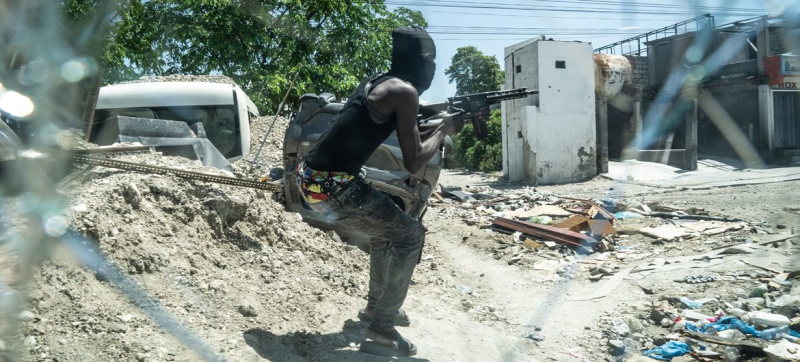- 94 Palestinians killed in Gaza, 45 people at aid sites |
- Opening of UN rights office at talk stage: Foreign Adviser |
- AC Tabassum Urmi sacked over anti- govt Facebook posts |
- Bangladeshi killed in BSF firing at Chuadanga border |
- Rains Fuel Disasters in 83pc of Brazilian Cities: Report |
Haitian Capital ‘Paralysed, Isolated’ Amid Gang Violence

Gangs control the majority of the Haitian capital, Port-au-Prince.
More than 1.3 million people have been displaced in Haiti as surging gang violence, lawlessness, and impunity expose the population – especially women and girls – to heightened risks of exploitation and sexual violence.
Since January, the UN Integrated Office in Haiti (BINUH) has recorded over 4,000 individuals deliberately killed – a 24 per cent increase compared to the same period in 2024.
“The capital city was, for all intents and purposes, paralysed by gangs and isolated due to the ongoing suspension of international commercial flights into the international airport,” said Miroslav Jenča, Assistant Secretary-General for the Americas at the Department of Political and Peacebuilding Affairs (DPPA), addressing the Security Council on Wednesday.
Having recently visited the country, he warned that gangs have only “strengthened their foothold,” now affecting all communes of the Port-au-Prince metropolitan area and beyond, “pushing the situation closer to the brink.”
He called on the international community to act decisively and urgently, warning that the “total collapse of state presence in the capital could become a very real scenario.”
Ghada Fathi Waly, Executive Director of the UN Office on Drugs and Crime (UNODC), echoed the warning.
“As gang control expands, the state’s capacity to govern is rapidly shrinking, with social, economic, and security implications,” she told ambassadors, speaking remotely from Vienna.
“This erosion of state legitimacy has cascading effects,” she said, with legal commerce becoming paralysed as gangs control major trade routes, further worsening already dire levels of food insecurity and humanitarian need.
Amid growing public frustration over the state's limited protection capacity, “vigilante” or self-defence groups are gaining in popularity.
Although some are motivated by the urgent need to protect their communities, many operate outside existing legal frameworks, in some cases engaging in extrajudicial actions or colluding with gangs.
The rise of these actors is fuelling demand for guns and military-grade weapons, “fuelling illicit arms markets and raising the risk of licit weapons being diverted to criminal elements,” Ms. Waly said.
Meanwhile, the broader deterioration of the security and economic situation in the capital and across the country continues to drive a sharp escalation in human rights violations.
Despite persistent under-reporting of sexual violence due to fear of reprisals, social stigma, and lack of trust in institutions, BINUH has reported an increase in gang-related sexual violence in the past three months.
In May, Haitian police raided a medical facility in Pétion-Ville suspected of involvement in illicit organ trade, as allegations of trafficking in persons for organ removal emerged.
As the situation in Haiti remains desperate, “there is not a moment to lose,” Mr. Jenča urged.

